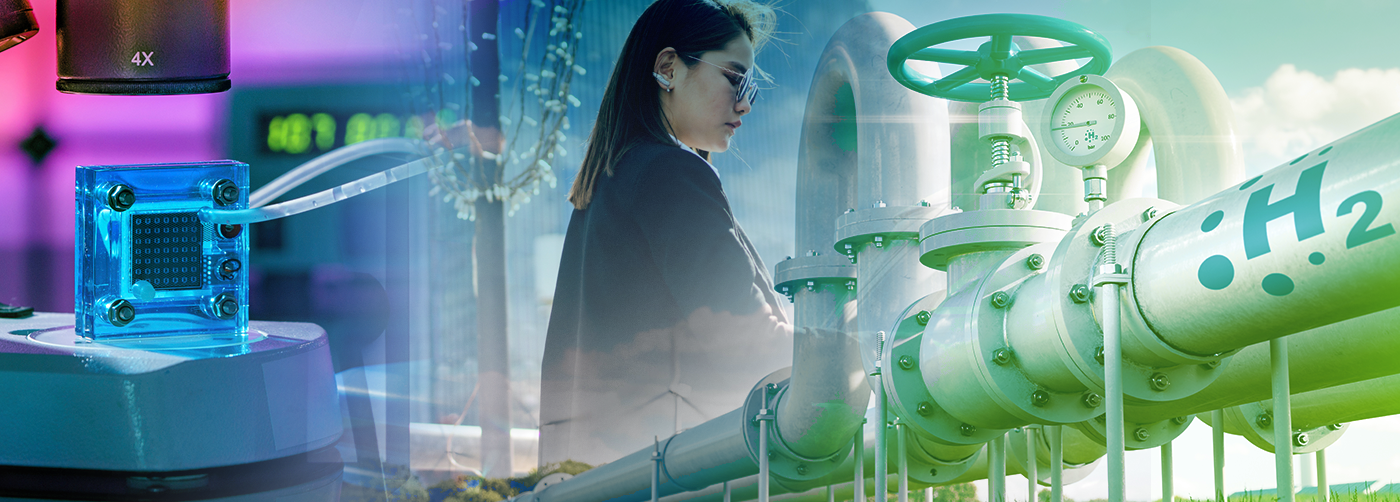Adopting hydrogen into our energy systems at scale holds the promise of a cleaner, greener, and lower carbon future if implemented correctly. Unintended consequences could negate some of hydrogen’s promises. It has also become obvious that our current energy systems do not provide everyone with the same level of benefit, or protect everyone equally from its harms. Georgia Tech researchers are studying how unintended consequences of hydrogen energy systems can be mitigated or avoided, as well as ensuring that a diversity of talent engages with hydrogen developmental opportunities and that we avoid a demographic divide of beneficiaries. Georgia Tech is engaging these and other critical points of equity because sustainable energy is about more than economic viability and environmental benefits.
Research Highlight
Characterizing the tendencies and levels of emissions associated with H2 combustion
Hydrogen is being explored as a means for converting intermittent, renewable power into a form that can be stored and distributed via fuel. This hydrogen can be utilized by thermal energy devices, such as gas turbines. While hydrogen combustion produces no CO2, it is important to also consider whether it leads to other negative environmental consequences. Combustion of hydrocarbons can lead to pollutant emissions such as SOx, particulates, CO, and NOx, all of which can lead to respiratory problems, smog, and acid rain. Hydrogen combustion eliminates the first three, but can still lead to NOx emissions. A critically important environmental justice issue around the energy transition is understanding and mitigating NOx emissions from hydrogen combustion.
The Ben T. Zinn Combustion lab, the largest university combustion research facility in the United States, is investigating NOx emissions from hydrogen and hydrogen/natural gas blends, particularly to address this question. This work is being done in close collaboration with the Electric Power Research Institute. First, we are performing numerical calculations which allows us to determine the lowest possible NOx emissions that these systems are capable of producing. Preliminary results from these calculations suggest that NOx emissions do not change substantially with hydrogen systems relative to natural gas systems, and are well under EPA regulations, assuming that combustion is performed in the lean, premixed mode utilized in modern, high-efficiency gas turbines. These calculations provide guidance for designers in terms of how close their systems are to fundamental limits. Second, we are performing measurements of NOx emissions, under high-pressure conditions encountered in modern energy conversion devices. Taken together, these analyses and measurements will provide advice to the technical, regulatory, and environmental justice communities regarding the impacts of hydrogen combustion on air quality (as well as ways to mitigate such impacts).

Fig. 1: Flat flame burner being used for NOx emissions measurements
{baseline, non-H2 fuel tests for reference}
Research Collaboration with Minority Serving Institutions
Advanced Hybrid System Combined Heat and Power
Institutions: Georgia Institute of Technology (primary), University of Texas at El Paso, National Energy Technology Laboratory
Project Description: The potential for significantly increasing the electrical efficiency of combined heat and power energy systems is being studied when fuel cells and fuel processing are incorporated into the system.
Investigators: Comas Haynes (Georgia Tech), Yirong Lin (UTEP)
Awarding Agency: Department of Energy
Evaluation/Facilitation of Fossil Energy Contributions to "Clean" H2 Infrastructure
Institutions: Florida A&M University (primary), Georgia Institute of Technology
Project Description: Introducing diverse STEM talent into the investigation of “clean” and effective means of producing hydrogen from fossil fuel sources to be incorporated into future H2 platforms.
Investigators: Juan Ordonez (FAMU), Comas Haynes (Georgia Tech)
Awarding Agency: Department of Energy
Researchers Active in Hydrogen Equity
Marilyn Brown - PubP
Marta Hatzell - ME
Comas Haynes - GTRI
Tim Lieuwen - AE





